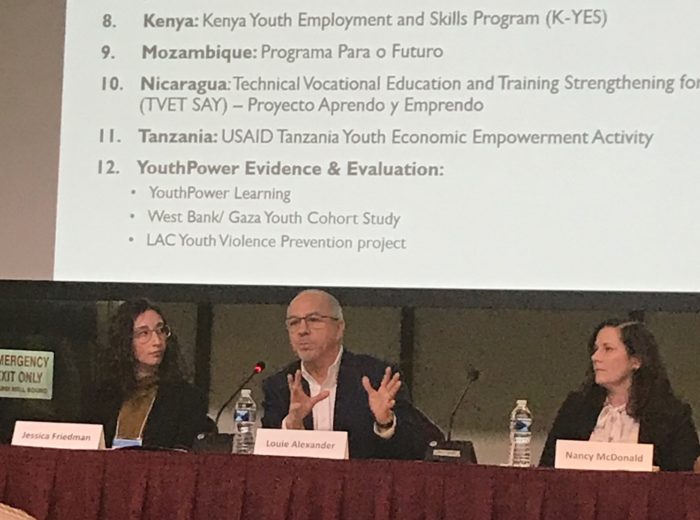Banyan Global Participates in 2020 YouthPower Annual Learning Meeting
On January 23, 2020, three members of Banyan Global’s youth practice attended the 2020 YouthPower Annual Learning Network Meeting hosted by the United States Agency for International Development (USAID) and organized by Making Cents International. The USAID-funded projects under the YouthPower Implementation and Learning indefinite delivery, indefinite quantity (IDIQ) contracts utilize a positive youth development (PYD) approach across sectors to improve the capacity of youth-led and youth-serving organizations worldwide. By working together with youth to unlock their full potential, YouthPower programs are meaningfully and sustainably engaging young people with their families and communities so they may lead happy, healthy, and productive lives. The all-day event was held at the National Housing Center and covered a variety of topics, including tools that have been produced by YouthPower’s international and national implementing partners and local learning that has emerged as a result of YouthPower projects. There were also debates over which modalities of communication can best help foster trust between implementing partners and the targeted youth populations, and discussions of how to best measure success.

During the morning program, Louie Alexander, Principal Associate at Banyan Global, participated in a four-person panel on the “Applications of Positive Youth Development–Experiences from the Task Orders.” The objective of the panel was to share the key takeaways from the YouthPower Implementation projects around the world as the YouthPower Learning IDIQ comes to an end this year. Mr. Alexander spoke about the USAID-funded Empleando Futuros (Employing Futures) project in Honduras, implemented by Banyan Global. He highlighted how the project’s progress towards its goal of providing realistic, sustainable employment opportunities for Honduran at-risk youth reflects the success that comes from the project’s market-driven private sector engagement strategy. When asked to describe a key takeaway, Mr. Alexander responded, “It is satisfying to see the extent to which we could focus on the needs of youth in high crime areas of the country, while providing them with a pathway that has been cultivated hand-in-hand with the business community.” The project team and partnering businesses have learned to co-craft an enabling environment where youth and the labor market actually influence the content and process of the project’s training and mentoring model. This approach has yielded great results, ranging from 64 percent training-to-job insertion rates for the general training program, to 89 percent training-to-employment rates for targeted jobs within specific sectors or companies.
One of the major challenges for any workforce development program is to gain the trust of the private sector while trying to better understand their specific workforce needs. As expected, during the early stages of Empleando Futuros’ implementation, private sector companies were slow to partner because the project had no track record of success to pitch to the business community. The project team quickly learned that results in both training and job insertion would take time, extensive outreach efforts, and a solid training quality, and that they would have to reach the business community with an innovative approach.
The project’s outreach to hundreds of companies, including results from a labor market assessment, yielded important insight into what the private sector was looking for. Overwhelmingly, companies said that life skills and soft skills were critical to recruitment and retention. While Empleando Futuros emphasized this in its training, it did not have concrete commitments from the business community; it seemed that the private sector preferred to be in a wait-and-see mode, possibly unwilling to risk hiring youth who came from high crime areas and were backed by a program that did not have a track record of placing youth into jobs.
As time went by, Empleando Futuros demonstrated that youth graduating from the program were well prepared in both technical and soft skills and were supported by an important accompaniment and mentoring model that ensured that youth would remain serious and committed to their employment pathways. After a period of engaging with several “early adopters” from the private sector, more and more companies decided to not only engage with the project, but also began to influence it through their own practices, training needs, and corporate cultures. This became a critical piece of the puzzle and one that led to the development of practical, appropriate, and replicable models, as well as the record training-to-job-insertion levels obtained by the project.
